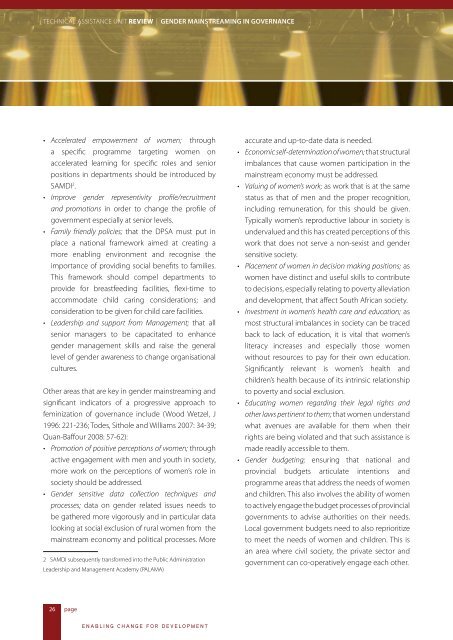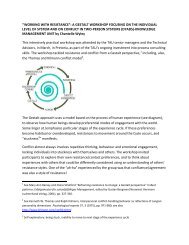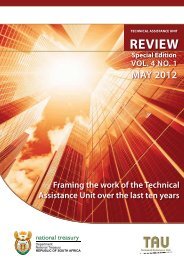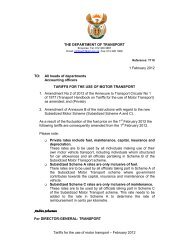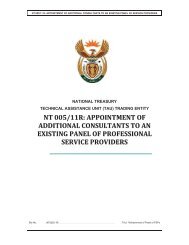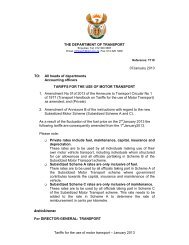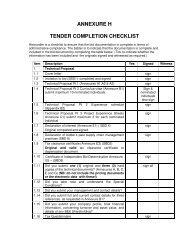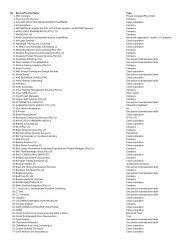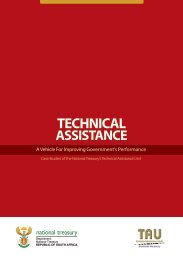Review 3 final 2 - TAU - National Treasury
Review 3 final 2 - TAU - National Treasury
Review 3 final 2 - TAU - National Treasury
You also want an ePaper? Increase the reach of your titles
YUMPU automatically turns print PDFs into web optimized ePapers that Google loves.
TECHNICAL ASSISTANCE UNIT REVIEW | Gender mainstreaming in governance<br />
• Accelerated empowerment of women; through<br />
a specific programme targeting women on<br />
accelerated learning for specific roles and senior<br />
positions in departments should be introduced by<br />
SAMDI 2 .<br />
• Improve gender representivity profile/recruitment<br />
and promotions in order to change the profile of<br />
government especially at senior levels.<br />
• Family friendly policies; that the DPSA must put in<br />
place a national framework aimed at creating a<br />
more enabling environment and recognise the<br />
importance of providing social benefits to families.<br />
This framework should compel departments to<br />
provide for breastfeeding facilities, flexi-time to<br />
accommodate child caring considerations; and<br />
consideration to be given for child care facilities.<br />
• Leadership and support from Management; that all<br />
senior managers to be capacitated to enhance<br />
gender management skills and raise the general<br />
level of gender awareness to change organisational<br />
cultures.<br />
Other areas that are key in gender mainstreaming and<br />
significant indicators of a progressive approach to<br />
feminization of governance include (Wood Wetzel, J<br />
1996: 221-236; Todes, Sithole and Williams 2007: 34-39;<br />
Quan-Baffour 2008: 57-62):<br />
• Promotion of positive perceptions of women; through<br />
active engagement with men and youth in society,<br />
more work on the perceptions of women’s role in<br />
society should be addressed.<br />
• Gender sensitive data collection techniques and<br />
processes; data on gender related issues needs to<br />
be gathered more vigorously and in particular data<br />
looking at social exclusion of rural women from the<br />
mainstream economy and political processes. More<br />
2 SAMDI subsequently transformed into the Public Administration<br />
Leadership and Management Academy (PALAMA)<br />
accurate and up-to-date data is needed.<br />
• Economic self-determination of women; that structural<br />
imbalances that cause women participation in the<br />
mainstream economy must be addressed.<br />
• Valuing of women’s work; as work that is at the same<br />
status as that of men and the proper recognition,<br />
including remuneration, for this should be given.<br />
Typically women’s reproductive labour in society is<br />
undervalued and this has created perceptions of this<br />
work that does not serve a non-sexist and gender<br />
sensitive society.<br />
• Placement of women in decision making positions; as<br />
women have distinct and useful skills to contribute<br />
to decisions, especially relating to poverty alleviation<br />
and development, that affect South African society.<br />
• Investment in women’s health care and education; as<br />
most structural imbalances in society can be traced<br />
back to lack of education, it is vital that women’s<br />
literacy increases and especially those women<br />
without resources to pay for their own education.<br />
Significantly relevant is women’s health and<br />
children’s health because of its intrinsic relationship<br />
to poverty and social exclusion.<br />
• Educating women regarding their legal rights and<br />
other laws pertinent to them; that women understand<br />
what avenues are available for them when their<br />
rights are being violated and that such assistance is<br />
made readily accessible to them.<br />
• Gender budgeting; ensuring that national and<br />
provincial budgets articulate intentions and<br />
programme areas that address the needs of women<br />
and children. This also involves the ability of women<br />
to actively engage the budget processes of provincial<br />
governments to advise authorities on their needs.<br />
Local government budgets need to also reprioritize<br />
to meet the needs of women and children. This is<br />
an area where civil society, the private sector and<br />
government can co-operatively engage each other.<br />
26<br />
page<br />
Enabling change for development


